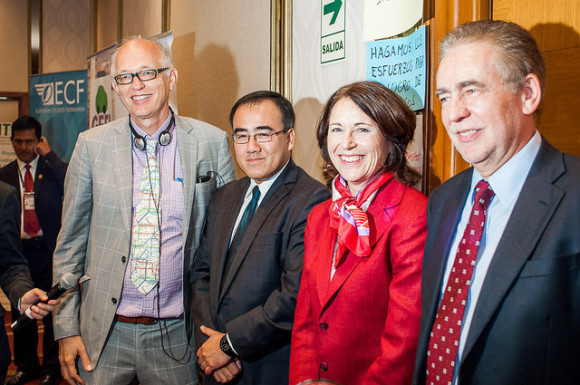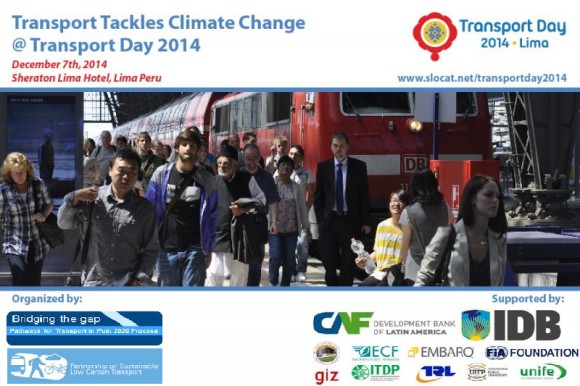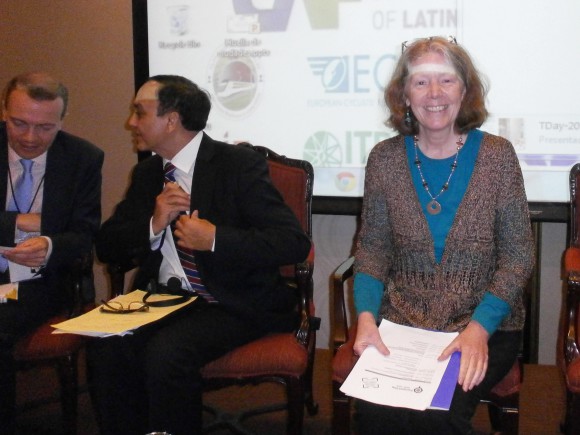
ECF & WCA promote cycling at UN Climate summit in Lima
World Cycling Alliance board member Dr Lake Sagaris at Transport Day 2014 in Lima:
“Cycling is more than a good idea: it is a crucial strategic component of sustainable transport”
Over 200 participants from around the world gathered in Lima Peru to hear experts in development, planning and sustainable transport evaluate progress and plan further actions for ensuring transport plays a prominent role in climate change strategies. The ECF/ WCA mission in Lima at the global UN climate summit COP20 was twofold: collaborating with the Sustainable Low Carbon Transport (SLoCaT) partnership to get sustainable transport higher on the global agenda, and to highlight cycling’s strategic importance there.
With more than 80 member organizations worldwide, SLoCaT has been successful in drawing attention to the importance of sustainable transport worldwide, working through the UN to include it in the Sustainable Development Goals and the climate action agenda. In recent years, its flagship event Transport Day, organized along with COP20 on this occasion, has attracted experts from around the world to evaluate progress and plan future activities.
 Cornie Huizenga, Secretary General, Partnership on Sustainable, Low Carbon Transport (SLoCaT), Jose David Gallardo Ku, Minister of Transport & Communications, Peru, Heather Allen, Program Director Sustainable Transport, Transport Research Laboratory (Spokesperson Bridging the Gap Initiative) Antonio Juan Sosa, Vice President of Infrastructure, CAF Development Bank for Latin America (Representing organizers of Transport Day 2014).
Cornie Huizenga, Secretary General, Partnership on Sustainable, Low Carbon Transport (SLoCaT), Jose David Gallardo Ku, Minister of Transport & Communications, Peru, Heather Allen, Program Director Sustainable Transport, Transport Research Laboratory (Spokesperson Bridging the Gap Initiative) Antonio Juan Sosa, Vice President of Infrastructure, CAF Development Bank for Latin America (Representing organizers of Transport Day 2014).
This year, ECF endorsed the event, bringing Lake Sagaris, a distinguished cycling advocate and planner from her home in Santiago, Chile to participate in Lima. Sagaris, winner of the International Award for Cycling Promotion (Danish Cycling Embassy, Velo-city Seville 2011), recently joined the board of the newly created World Cycling Alliance as one of two members from Latin America.
In her remarks, Sagaris stressed that cycling is not only a “good and healthy way to move around cities”. It is also a crucial strategic element in creating genuinely sustainable transport in cities of all sizes. “For good practice we need good theories, and this means we need to improve our definitions of sustainable transport,” she said. “We must replace the ‘mono-mode’ of the car with an ‘ecology of modes’, whose cornerstone is walking, but whose essential articulator should be cycling and public transport, mainly buses in the Americas, where distances are longer, and supplemented by trains, in Europe.”
“Public transport alone is not enough: we need integration, trunk roads no longer dedicated to cars, but rather giving priority to a bike-bus combination that favours excellent door-to-door service. And when I say bike-bus, I mean not only private bikes, but also bikeshare, bike taxis or rickshaws, cycle parking for medium and longer time periods, and other elements.”
In some Santiago neighbourhoods, two-thirds of all trips are by walking, mostly by women, giving them “a very small radius of action, and reducing their access to jobs, education and other important services,” Sagaris said. "Giving priority to cycle integration, which would increase their sphere of access to 10 km or more, is a matter of social justice. We don’t talk about social sustainability enough, or define it very clearly, in particular with regard to transport. Social justice must be the heart of sustainability.”
Sagaris, an expert in participation and civil society development, emphasized the importance of pressure from grass roots movements and their connecting directly to peers worldwide. This makes the ECF’s leadership in creating the World Cycling Alliance key. She also underlined the value of the ECF’s international Velo-city conference series, which brings together leading scientists, advocates, politicians and technical staff committed to cycling.
Her words complemented an earlier presentation from Alejandro Nieto, Vice-Minister of Urban Development and Housing (Mexico), on the involvement of citizens (education, media and communication, participation), and the importance of high density cities, with multiple centres and housing development with local services to reduce distances and trips.
Similarly, Pierre Serne, co-chair of Region Ile de France (Paris) and co-chair of the Transport Authority in Ile de France spoke of the problems inherent in a land use policy that means that every day 1 million people have to commute long distances by train in the Paris area to travel from home to work. He regretted the strength of the car and diesel lobby in France, but expressed determination to reduce the number and lengths of trips and achieve ambitious targets for the active modes walking and cycling.
WCA and ECF also announced a major campaign to implement voluntary commitment from the cycling transport sector to boost cycling as part of helping the UN-led effort to tackle climate change (and a lot of other global challenges!) effectively. The ECF has already provided evidence that cycling more often can contribute to global warming by reducing CO2 emissions. Our new jobs study Cycling Works demonstrated that for every million euros spent, 4.8 jobs are created, a much higher return than the 1.4 for an equivalent investment in cars. SLoCaT promoted this study together with other interesting studies in Lima and here.
- Log in to post comments
Contact the author
Recent news!
Upcoming events
Contact Us
Avenue des Arts, 7-8
Postal address: Rue de la Charité, 22
1210 Brussels, Belgium












